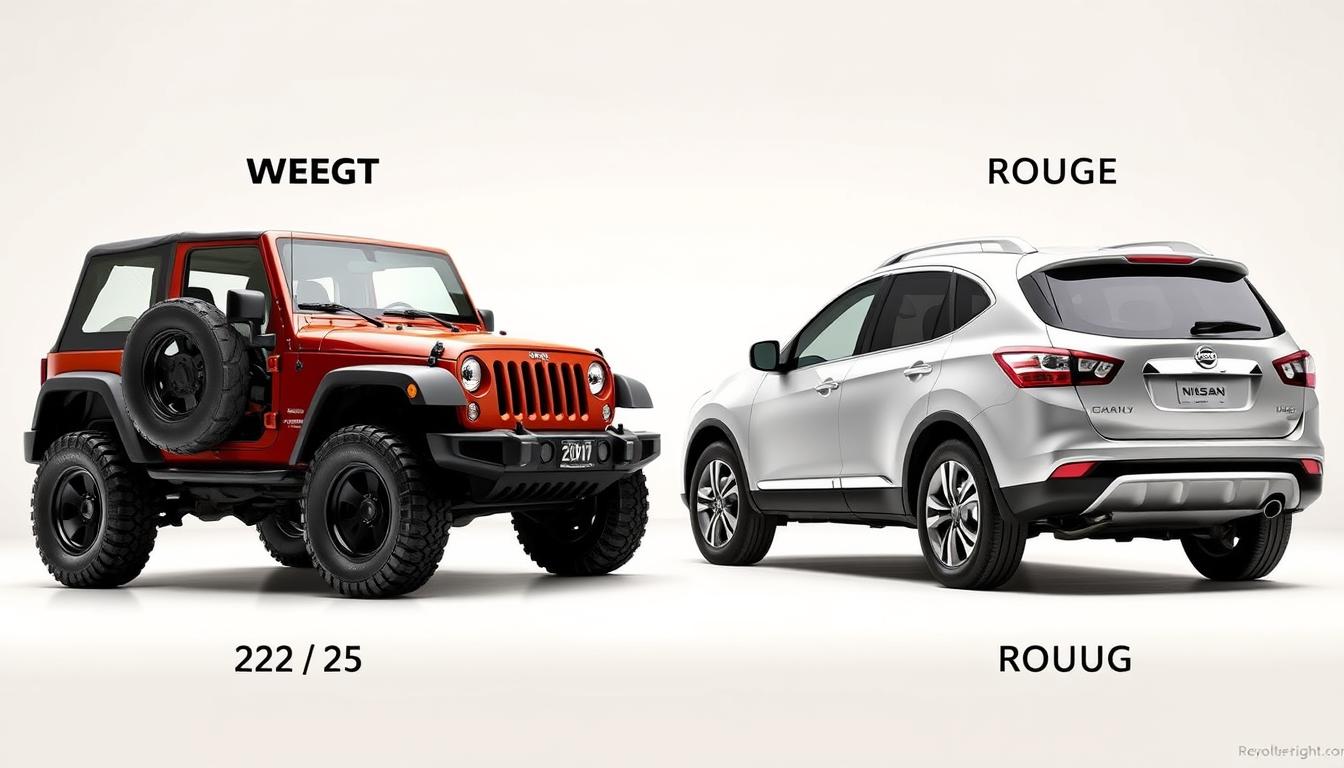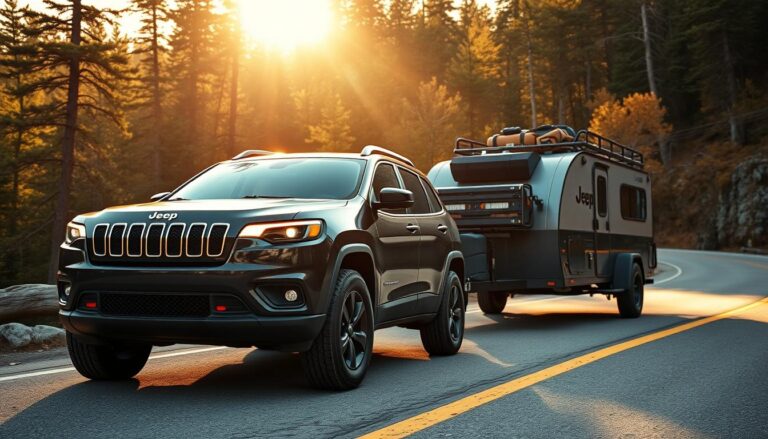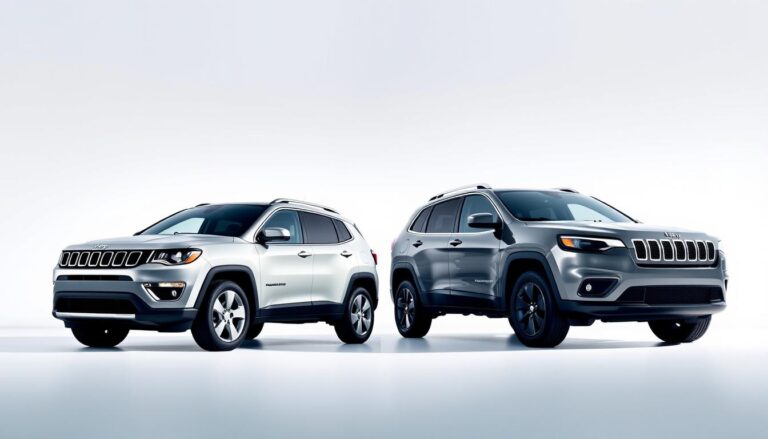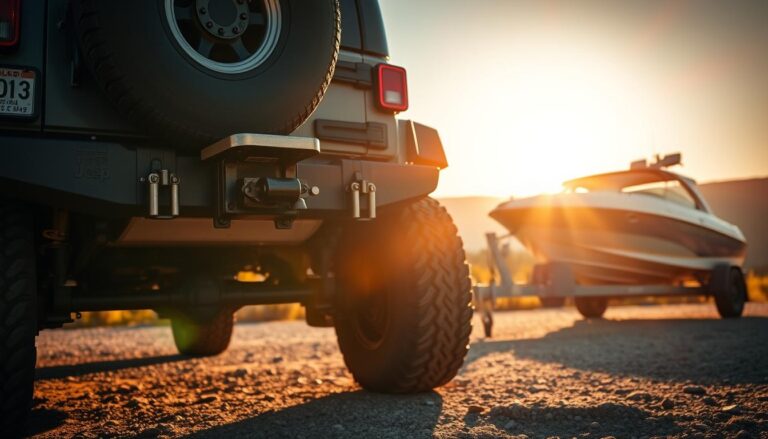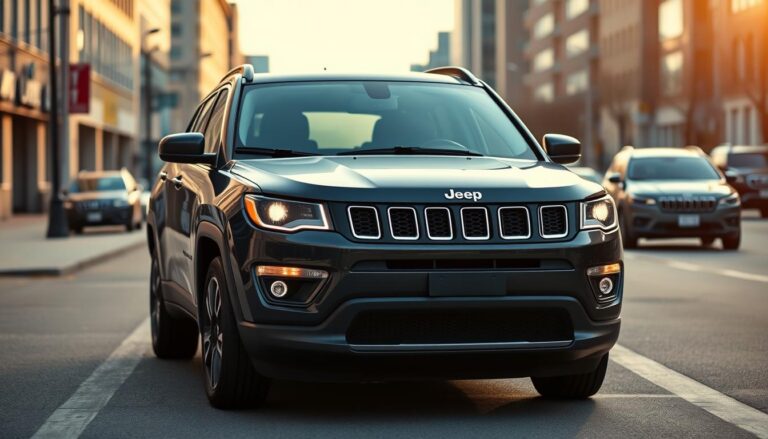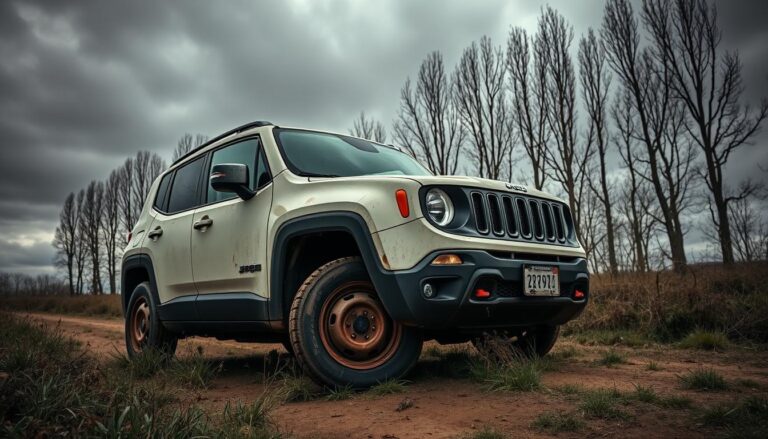2012 Jeep Wrangler Weight vs Nissan Rogue Weight
When looking for the perfect SUV, knowing the vehicle’s weight is key. The 2012 Jeep Wrangler and Nissan Rogue show two different design paths. Each has its own weight, making them unique in the comparison.
Vehicle weight affects driving in many ways, like fuel use and how it handles. Many people don’t think about this, but it’s very important. Choosing between these two models means understanding their weights and how they affect driving.
The 2012 Jeep Wrangler is known for its off-road skills. The Nissan Rogue is for city drivers who want comfort and practicality. Their weights show what each is made for.
Car lovers and practical buyers need to know about the 2012 Jeep Wrangler and Nissan Rogue’s weights. This comparison will look at important weight factors. These include curb weight, payload capacity, and how they perform.
Choosing a car is more than looks. Weight is key for safety, fuel use, and driving feel. By comparing these two SUVs, you’ll learn more than just surface-level facts.
Whether you love off-roading or need a reliable city car, knowing weight differences is important. This detailed analysis will help you understand these two cars better.
Vehicle Weight Classifications and Importance
Vehicle weight is key in car design and how well it performs. SUV curb weights show a vehicle’s basic traits. Makers aim to balance safety, fuel use, and driving feel by adjusting weight and size.
Knowing about vehicle weights helps us see what a car can do and what it can’t. It’s important for buyers to understand these weights when choosing a car.
Types of Vehicle Weight Measurements
- Curb Weight: The standard weight of a vehicle without passengers or cargo
- Gross Vehicle Weight Rating (GVWR): Maximum operational weight including passengers and cargo
- Payload Capacity: Maximum weight a vehicle can safely carry
- Unloaded Vehicle Weight: Weight of the vehicle without additional equipment
Impact of Weight on Vehicle Performance
| Weight Factor | Performance Impact |
|---|---|
| Increased Weight | Reduced acceleration and fuel efficiency |
| Balanced Weight Distribution | Improved handling and stability |
| Lightweight Construction | Enhanced maneuverability |
Weight Ratings Explained
Vehicle weight ratings are vital for safety. They tell drivers how much weight they can carry safely. This prevents damage or safety issues.
It’s important to check the maker’s specs for safe driving and best performance.
2012 Jeep Wrangler Base Weight Specifications
The 2012 Jeep Wrangler is a top choice for those who love rugged vehicles. Its base weight shows its strong design. Knowing these specs helps buyers see the Wrangler’s strength and how it performs.
There are two main body styles for 2012 Wranglers. Each has its own weight:
- Two-door Sport model
- Four-door Unlimited model
The Wrangler’s body-on-frame design adds to its weight. This makes it durable and great for off-roading. The weight changes based on the trim level and extra features.
| Wrangler Model | Base Curb Weight | Weight Configuration |
|---|---|---|
| Two-door Sport | 3,143 lbs | Standard Chassis |
| Four-door Unlimited Sport | 3,735 lbs | Extended Chassis |
| Rubicon Unlimited | 4,050 lbs | Heavy-Duty Off-Road |
Things that make the Wrangler heavy include its solid axles, thick steel frame, and strong suspension. These features make the Jeep Wrangler a top choice for off-road adventures.
2012 Nissan Rogue Base Weight Details
The 2012 Nissan Rogue is a great SUV with special features. Its weight is key to its performance and design. Knowing the SUV’s curb weight helps us understand its abilities and how it uses fuel.
Looking into the Rogue’s weight tells us a lot. It’s important for anyone thinking of buying one or for car lovers. The base model has a smart weight setup that affects how it drives and its fuel use.
Standard Model Weight Distribution
The 2012 Nissan Rogue has a smart weight spread. Here are some important weights:
- Base curb weight: About 3,221 pounds
- Front-to-rear weight ratio: About 60:40
- Ground clearance: 7.3 inches
Weight Variations Across Trim Levels
Nissan had different Rogue trims, each with its own weight:
- S Model: Lightest at 3,221 pounds
- SV Model: A bit heavier with more features
- SL Model: Heaviest with top-notch equipment
Impact on Fuel Economy
The Rogue’s weight affects its fuel use. Its balanced weight helps it get good gas mileage. It can go about 22 miles per gallon in the city and 28 on the highway.
Nissan made the Rogue to be light, yet strong and fuel-efficient. It’s a smart choice for a practical SUV.
Comparing Body Structure and Construction
Off-road vs family SUVs have different body structures. The 2012 Jeep Wrangler and Nissan Rogue show how design and engineering vary. These differences affect how well a vehicle performs and lasts.
The Jeep Wrangler has a body-on-frame design. This is common in off-road vehicles. It offers:
- Enhanced structural rigidity
- Superior durability for challenging terrain
- Easier component replacement
The Nissan Rogue, on the other hand, has a unibody construction. This is typical in family SUVs. It provides:
- Lighter overall vehicle weight
- Improved on-road handling
- Better fuel efficiency
The choice of materials is key in each vehicle’s build. Wrangler’s construction emphasizes strength, using high-strength steel and aluminum. The Rogue focuses on being light and comfortable, using materials that make it better for passengers.
Vehicle dimensions also play a role. The Wrangler’s frame helps it tackle tough terrain. The Rogue’s design is better for city and suburban driving.
2012 jeep wrangler weight vs nissan rogue weight: Direct Analysis
Looking at vehicle weight gives us clues about how they perform and feel to drive. The 2012 Jeep Wrangler and Nissan Rogue show two different ways to design an SUV. They have big differences in their weight.
When we compare the weights of these two models, we see their design ideas. The Jeep Wrangler is built tough, so it’s heavier. The Nissan Rogue is made for city driving, so it’s lighter.
Model-Specific Weight Differences
Here are the exact weights for each vehicle:
- 2012 Jeep Wrangler Sport: Approximately 3,760 lbs
- 2012 Nissan Rogue S: Approximately 3,370 lbs
- Weight difference: Around 390 lbs
Platform Design Impact on Weight
The design of each vehicle affects its weight. Jeep uses a body-on-frame design, making it heavier. Nissan Rogue has a unibody design, which is lighter.
| Vehicle Characteristic | Jeep Wrangler | Nissan Rogue |
|---|---|---|
| Construction Type | Body-on-Frame | Unibody |
| Primary Design Purpose | Off-Road Capability | Urban Commuting |
| Weight Impact | Heavier Structural Design | Lighter Compact Design |
Weight Distribution Comparison
How weight is spread out affects how a vehicle handles. The Jeep Wrangler has its weight evenly distributed for better off-road performance. The Nissan Rogue is designed for easy city driving.
Knowing these weight differences helps drivers choose the right vehicle for their needs.
Payload Capacity and Load Limits
Knowing your vehicle’s payload capacity is key for those who haul cargo or equipment. Payload capacity is the max weight a vehicle can carry safely. This includes passengers, cargo, and extra gear. The 2012 Jeep Wrangler and Nissan Rogue have different payload capacities based on their setup.
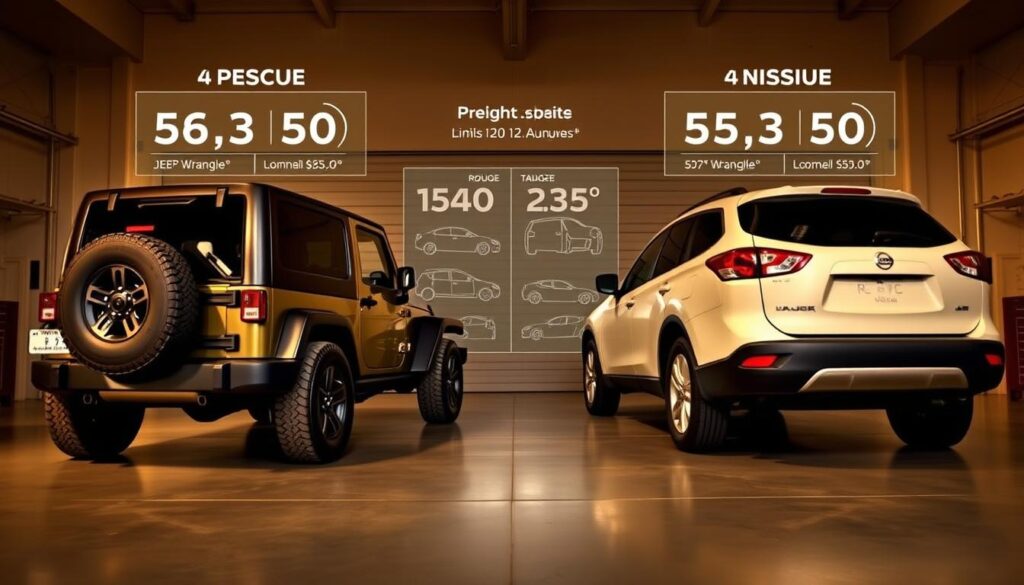
Vehicle setup greatly affects payload limits. The Jeep Wrangler, built for tough terrain, has varying payload capacities. The type of body, drivetrain, and extra features all play a part in the total payload capacity.
- Two-door Wrangler models usually have lower payload capacities
- Four-door Wrangler Unlimited models offer more cargo space
- The design of the suspension and chassis also affects payload capabilities
The Nissan Rogue, a compact SUV, focuses on passenger comfort while keeping load-carrying practical. Its design is geared towards city driving.
| Vehicle Model | Base Payload Capacity | Maximum Payload |
|---|---|---|
| 2012 Jeep Wrangler Sport | 1,000 lbs | 1,200 lbs |
| 2012 Jeep Wrangler Unlimited | 1,200 lbs | 1,500 lbs |
| 2012 Nissan Rogue S | 850 lbs | 1,100 lbs |
Drivers need to think about their specific payload needs. Going over the recommended load can harm vehicle safety, handling, and performance. Always check the owner’s manual and manufacturer specs before loading up.
Towing Capabilities and GVWR Comparison
Knowing a vehicle’s towing capacity is key for those hauling trailers, boats, or heavy equipment. The 2012 Jeep Wrangler and Nissan Rogue have different towing abilities. These reflect their unique designs and engineering.
Looking at the Jeep Wrangler’s specs, towing capacity is a standout feature. The 2012 Jeep Wrangler outshines the Nissan Rogue in towing. This makes it better for outdoor lovers and those who need to haul heavy loads.
Maximum Towing Ratings
Here’s a comparison of towing capacities between these two vehicles:
- 2012 Jeep Wrangler Sport: Up to 2,000 lbs towing capacity
- 2012 Jeep Wrangler Unlimited: Up to 3,500 lbs towing capacity
- 2012 Nissan Rogue: Approximately 1,500 lbs towing capacity
Trailer Weight Recommendations
Choosing the right trailer weight is vital for safety and performance. Here are some guidelines:
| Vehicle | Recommended Max Trailer Weight | Trailer Type |
|---|---|---|
| Jeep Wrangler Sport | 1,800 lbs | Small boat or utility trailer |
| Jeep Wrangler Unlimited | 3,200 lbs | Larger boat or camper trailer |
| Nissan Rogue | 1,300 lbs | Small utility trailer |
Pro tip: Always check your vehicle’s manual for towing specs and safety tips. Terrain, driving conditions, and trailer type affect towing performance.
Impact of Weight on Off-Road Performance
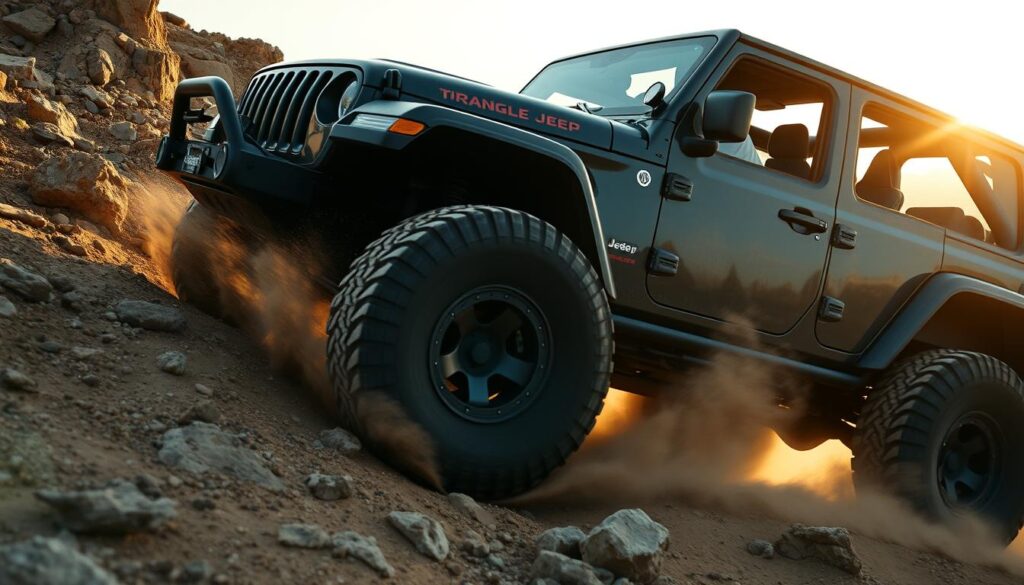
The weight of off-road vs family SUVs is key in navigating terrain. Jeep Wrangler specs show it’s built for off-road, thanks to its weight and design.
Vehicle weight is vital for off-road performance. The Jeep Wrangler’s weight gives it several benefits:
- Enhanced ground clearance
- Improved traction control
- Better weight-to-power ratio
- Superior suspension articulation
Heavier vehicles like the Wrangler stay stable on tough terrains. Rock crawling, mud driving, and sand dune navigation are easier with its weight. The Wrangler’s weight keeps it in contact with uneven surfaces, ensuring grip and control.
Family SUVs, like the Nissan Rogue, are made for smooth roads. They’re lighter and have suspension for streets, not off-road. The Wrangler’s weight lets it move better on tough terrain, making it better for adventurous drivers.
Important off-road performance factors include:
- Weight-to-power ratio
- Suspension flexibility
- Ground clearance
- Tire contact patch
Knowing these factors helps drivers pick the right vehicle for their terrain needs. The Jeep Wrangler is a top choice for off-road adventures.
Fuel Efficiency and Weight Correlation
Vehicle weight is key to fuel economy. Looking at the 2012 Jeep Wrangler and Nissan Rogue shows how weight affects fuel efficiency.
The link between vehicle weight and fuel use is complex. Heavier cars need more energy to move, which affects MPG ratings. We’ll see how each car’s weight impacts its fuel economy.
City MPG Performance
City driving is tough for fuel efficiency. Frequent stops and starts use more energy, with weight being a big factor.
| Vehicle Model | City MPG | Weight Impact |
|---|---|---|
| 2012 Nissan Rogue | 22 MPG | Lower weight helps in city driving |
| 2012 Jeep Wrangler | 17 MPG | Higher weight hurts city fuel economy |
Highway Fuel Economy Analysis
Highway driving shows different efficiency patterns. Aerodynamics, powertrain design, and weight all play a role in long-distance fuel use.
- Nissan Rogue: Lighter design helps with better highway MPG
- Jeep Wrangler: Strong design focuses on performance over fuel efficiency
The complex relationship between weight, design, and fuel economy shows specs only tell part of the story. Drivers need to look at many factors to judge a car’s true efficiency.
Weight Distribution and Handling Characteristics
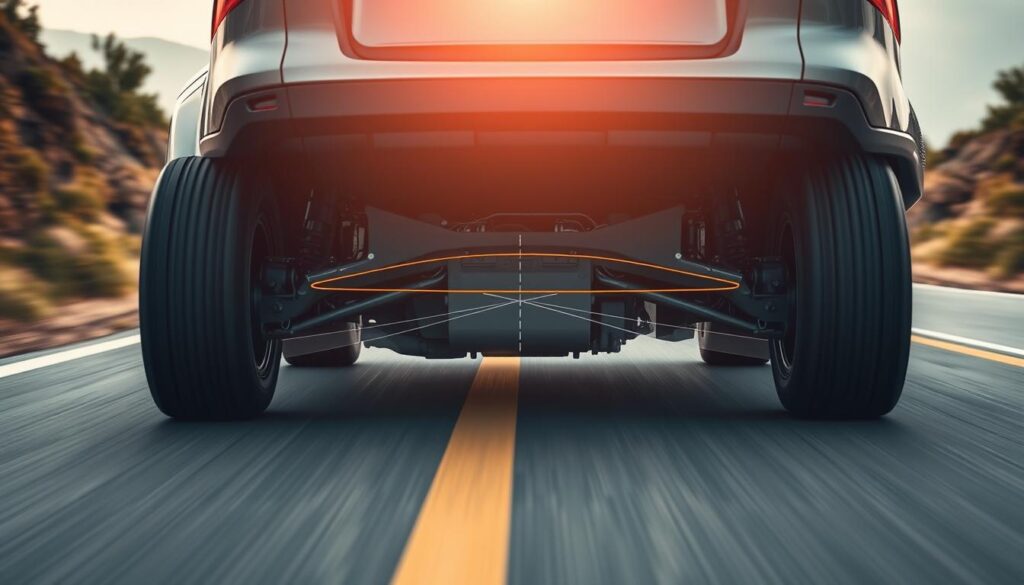
Knowing the curb weight of an SUV is key to understanding its performance and how it handles. The 2012 Jeep Wrangler and Nissan Rogue show how different weight distributions affect their driving.
How a vehicle is set up affects where the weight is placed. The Jeep Wrangler has a design for off-road adventures. This gives it:
- Stability on rough ground
- More ground clearance
- Better weight shift when turning
The Nissan Rogue is made for city driving. It has a balanced weight for:
- Smooth driving in the city
- Easy steering
- A comfortable ride
Where the weight is placed affects the suspension and how stable the vehicle is. The suspension and weight work together to make each SUV handle differently.
Tire choice and suspension design also play a part. They help the driver feel the difference in handling. The Wrangler feels sturdy, while the Rogue feels quick and agile.
Weight Impact on Safety Features and Ratings
Vehicle weight is key to safety for both off-road and family SUVs. The 2012 Jeep Wrangler and Nissan Rogue show how weight affects crash protection and safety ratings.
Experts say weight comparison is vital for occupant safety. Heavier vehicles often have better crash protection. The Jeep Wrangler’s strong build offers more safety, thanks to its rugged design. The Nissan Rogue focuses on family safety with a different approach.
- Structural weight impacts crash absorption capabilities
- Heavier vehicles generate more momentum during collision
- Weight distribution affects electronic stability systems
Crash tests show each vehicle’s safety features. The Wrangler’s off-road design makes it sturdy. The Rogue uses lightweight materials for family safety.
Important safety techs rely on vehicle weight:
- Electronic Stability Control
- Antilock Braking Systems
- Crumple Zone Design
Manufacturers balance weight and strength for safety and performance. The right weight balance is key to safety ratings that protect everyone inside.
Vehicle Modifications and Weight Changes
Vehicle modifications can change how a jeep wrangler works and looks. Owners often add custom parts to make their vehicles better for off-road adventures. It’s important to know how these changes affect the vehicle’s weight.
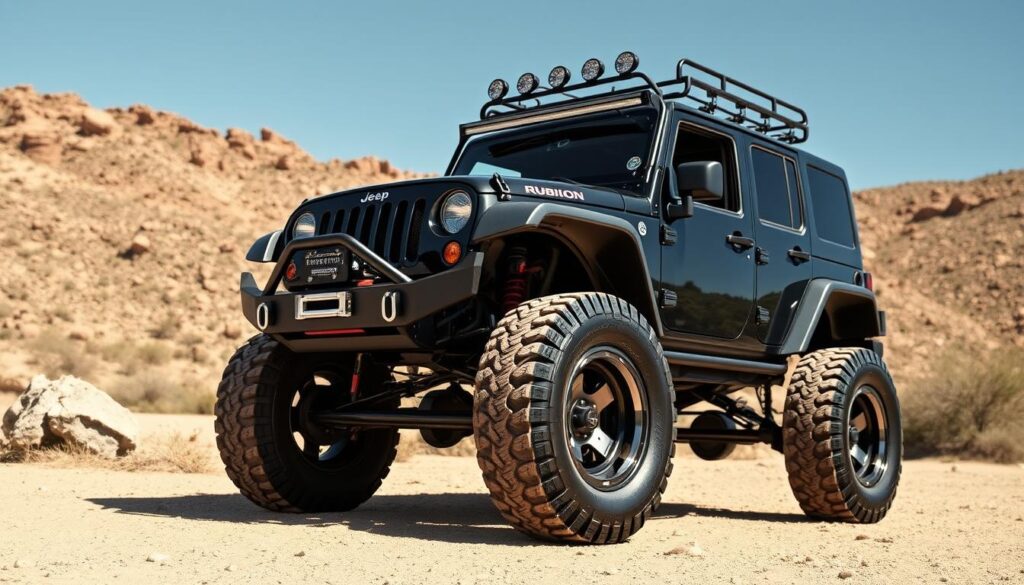
When adding new parts, drivers need to think about the weight. Some common changes can make a big difference:
- Lift kits that raise vehicle height
- Larger off-road tires
- Heavy-duty bumpers and protective armor
- Roof racks and external storage systems
- Advanced suspension upgrades
Common Aftermarket Additions
Each addition has its own weight impact. Lift kits can add 50-100 pounds. Heavy-duty bumpers can add another 100-150 pounds. These changes affect how the vehicle handles, uses fuel, and performs overall.
Weight Management Considerations
It’s key to manage weight when modifying a vehicle. Drivers should:
- Check the manufacturer’s weight limits
- Spread added weight evenly
- Get professional help with installation
- Keep an eye on suspension and brake performance
Knowing how modifications affect weight helps owners make smart choices for their Jeep Wrangler upgrades.
Conclusion
The weight comparison between the 2012 Jeep Wrangler and Nissan Rogue shows big differences. These differences affect how well each vehicle performs and how it feels to drive. Our detailed look shows how weight is key in off-road skills and fuel use.
The Jeep Wrangler is built tough and is heavier, making it great for off-road adventures. On the other hand, the Nissan Rogue is lighter and better for city driving. Buyers need to think about what they want from a car before choosing.
The right choice depends on what you like and how you plan to use the car. If you love the outdoors, the Wrangler might be for you. But if you’re more into city life, the Rogue could be better. Our comparison helps you decide based on your lifestyle.
Knowing how weight affects a car’s performance helps you pick the best SUV for you. Both the Jeep Wrangler and Nissan Rogue have their own strengths. Weight is a big factor in what makes each car special.

